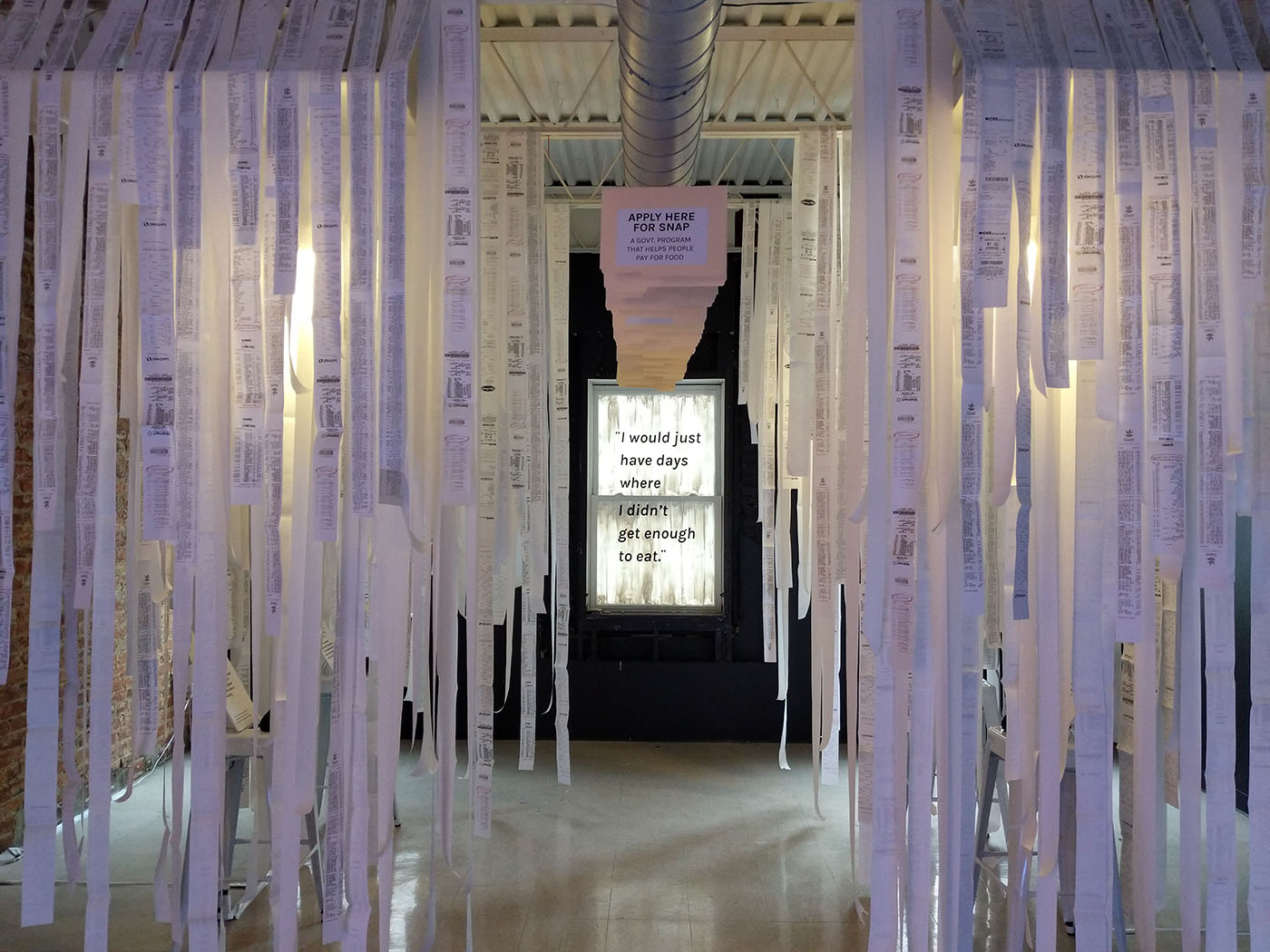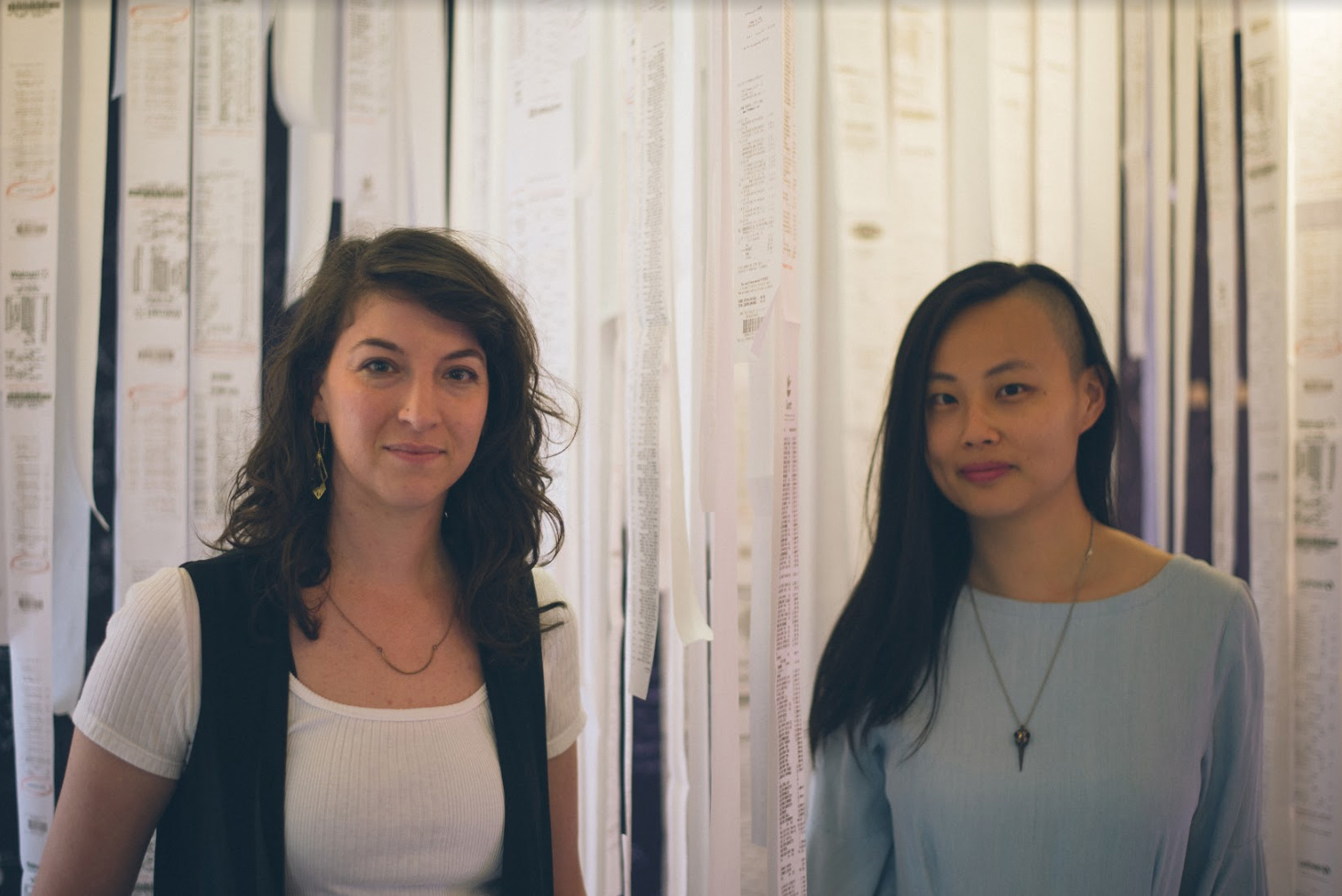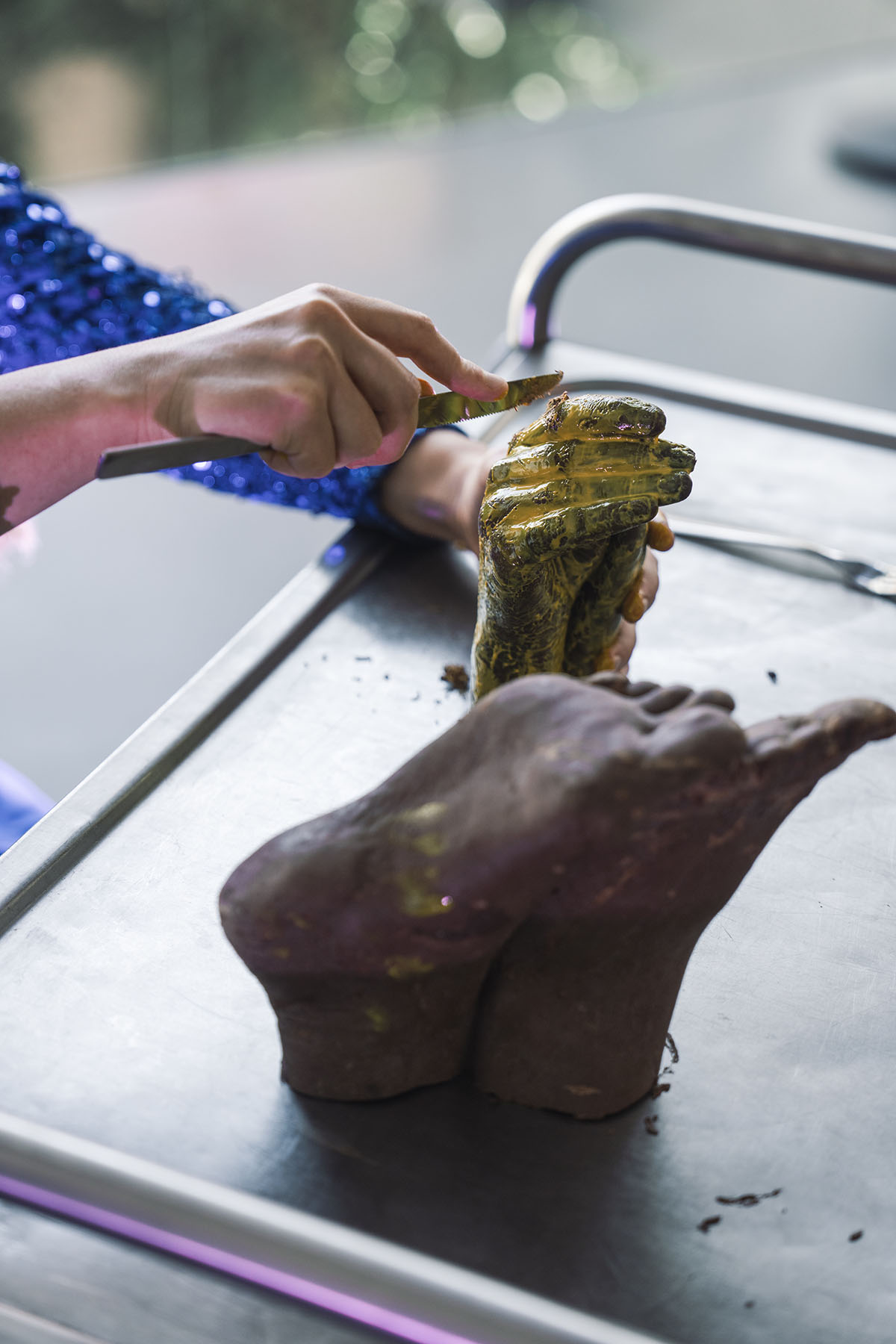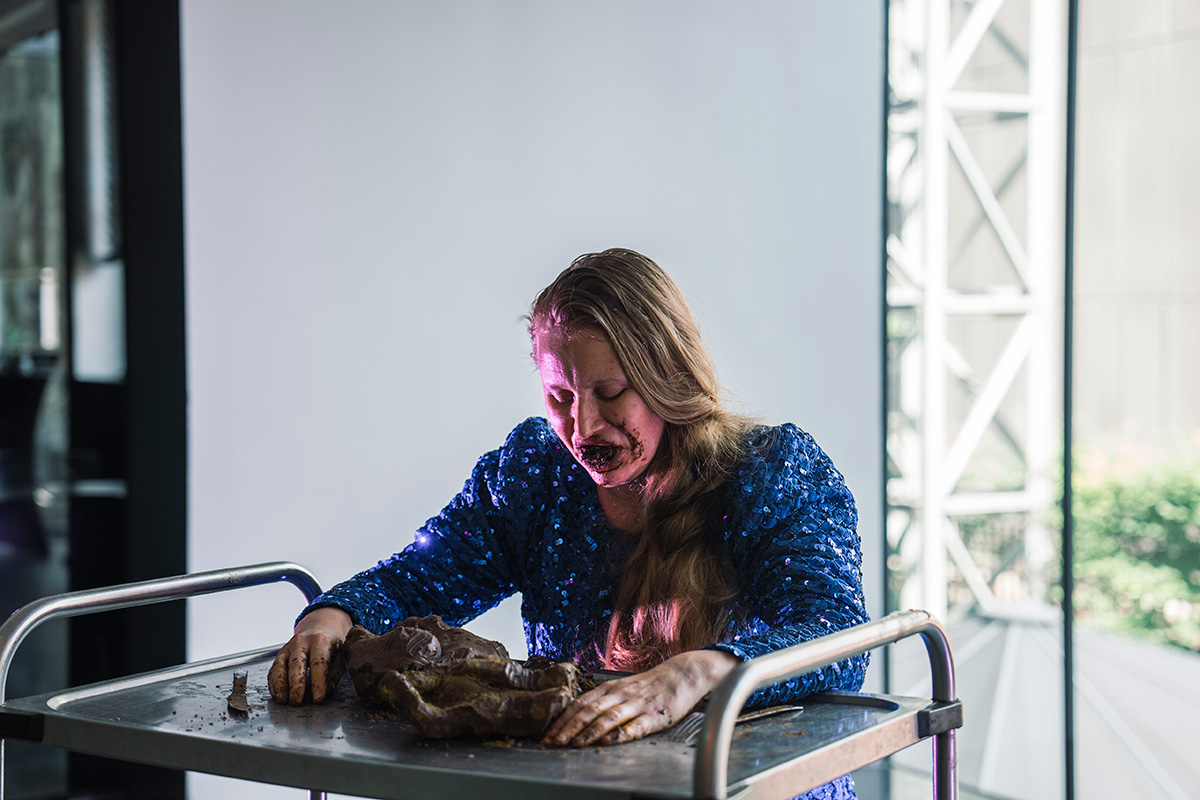
In July 2022, the Performance in Historical Paradigms Working Group brought together five artists whose creative work engages with issues related to food, hunger, and insatiability. Taking up the provocation of the PSi #27 conference theme “Hunger,” we explored the matrices of the material practices, embodied experiences, socio-economic conditions, as well as the psychosomatic and affective modalities of hunger.
The formally diverse works that comprised the online exhibition—and which are now included here—approach these issues from a distinctly feminist perspective: they problematize the fetishization of the deprived female body, the oppressive powers that generate inequities of food distribution, and the heteronormative gender norms that perpetuate women’s responsibilities as nurturers, providers, and caretakers. Further, they examine the ways in which these processes are socially structured and transmitted intergenerationally. The pieces demonstrate how instances of contemporary crises are rooted in enduring historical legacies and entrenched in systemic inequities.
The real, physical experience of hunger is not a theoretical construct. “Insatiabilities”—our guiding curatorial concept—opens up broader connotations and other registers of affectively experienced needs and desires. The prefix “in” negates. It is a performative marker that disallows the attainment of its Latin etymological root of satis (enough) and intimates a need or desire that can never be assuaged. “Insatiability” emphatically captures the tension between the simultaneity of yearning and knowing that this want can never be fully realized. And yet, the desire is so overpowering that one cannot help but attempt renewed forms of fulfillment—against the impossible.
Our curatorial interest lies in the gendered experience of insatiabilities. Specifically, we seek to explore the many ways in which female subjectivity is socially structured—and perceived—as cycles of unfulfillable needs and desires. The artworks that comprise this exhibition expose the inextricable entanglements between lack and excess–as such, they reveal the push and pull between the “more” and the “not enough.” This oscillation between excess and lack marks an existential mode of being that occupies both a subject position and its relationality to objects—particularly as it emerges in gendered settings. We link the subject with identity positions along with their concomitant perceptions of self. In this context, we understand “object” in two ways. The first is a psychoanalytic delineation of the process by which the subject is rendered an object in the eyes of the other. The second refers to physical objects and their performative engagements within material culture.
In the formation of the neoliberal subject, a perceptual sense of lack—insatiability—becomes internalized. To conceal lack—to compensate for this existential sense of not-being-enough—the subject acts out and thereby creates spectacles of excess. The threat of excess at times leads to (self) deprivation or the internalization of external systems that generate the illusion of scarcity. The artists exhibited here explore through different mediums how lack and excess are mutually constitutive formations; they demonstrate that in a wide range of sociopolitical contexts lack spurs excess and excess creates the perception of lack. They gesture beyond the sexualized conceptualizations of female and feminine lack and excess that often–even when intended as subversion–perpetuate the perception of an objectifying male gaze. Instead, the artworks capture the visceral experiences of transgenerational trauma and healing, body dysmorphic/image disorder, extreme—unremitting—poverty and socio-political vulnerability, and suggest that the oscillation between lack and excess creates a looping mechanism. This perpetual back-and-forth between the two, along with the sensed existential threat that either or both might be exposed, constitute gendered bodies affectively wavering between a transient sense of fulfillment and overinflation that often manifests in excessive acting out, which then turns into shame and self-deprivation.
Of the artists presented here, Ariel Smith’s work captures most tangibly how lack and excess perpetually constitute each other. One of the protagonists of this short film is a young woman, who excessively attempts to alleviate the existential lack at the center of her life—caused by settler-colonial intergenerational trauma, family dynamics, and body image disorder. Smith, an award-winning filmmaker, video artist, and the Artistic and Managing Director of Native Women in the Arts in Canada, in her short film Hunger (2020) undertakes the theme of intergenerational transmission with food marking the point of contact and transitional object that links the three figures of a nuclear family: father, mother, and daughter. While for the young, stay-at-home mother, Lucy, is a means of nurturing her young daughter, Lily, she denies herself that same care by adhering to an excessive exercise and restrictive food regimen. The eating disorder from which she suffers is not only a psychosomatic symptom of the repressive relationship with her partner, but an index of larger socio-political, colonial, and systemic violence internalized. What on the surface appears as merely a restrictive eating pattern is, in effect, a decolonial refusal to digest the white bread of the colonizer. This act of abjection becomes a subversive refutation of oppressive colonial regimes that structure daily embodied practices—down to the very food we eat.
Intergenerational care in the face of the traumas of migration, exile, and colonialism is at the center of Lebanese visual artist Rima Najdi’s work. While growing up in Sarifa, food and its preparation were at the heart of the daily life of her family. Though now based in Berlin and affiliated with The MA Solo/Dance/Authorship (SODA) program at HZT – Inter-University Centre for Dance Berlin, UDK, Najdi still regularly consults her mother about cooking and family recipes. In Three Colors, she invites her mother, Rabiha Tawil, and sister, Racha Najdi, to cook together. On a video call, three women in three cities (Berlin, Sarifa, and Istanbul) cook one of the family’s favorite meals: a southern Lebanese dish called mjadara hamra. Despite their co-presence in the virtual space of the call, the film initially emphasizes the women’s separateness. This is astutely expressed by the sharply divided frames of the shared video screen, as well as the discussion of the varying resources and gastro-economic conditions of their dissimilar locations. Nevertheless, the shared–at once mundane and deeply ritualistic—acts of cooking, the sight of the similar ingredients and the relaxed conversation, gradually (re)create the space of intimacy for the family. Najdi’s work beautifully captures the intergenerational transmission that practices of shared cooking enact—both the knowledge of ingredients, techniques, and traditions, as well as the cultural and familial joys of cooking. And yet, the performance leaves some desires unsatiated, not only for the Najdi family, but also the many families affected by migration—especially in the global South—who cannot sit down around the same table to enjoy a meal they prepared together.
Transaction Denied (2019), an installation created by artists, designers, and community organizers Xena Ni and Mollie Ruskin, exposes the violent constrictions that external hegemonic power systems impose on individuals living with food insecurity. The work, which displays a multitude of grocery receipts marked “transaction denied,” indexes moments in time when individuals were unable to redeem the food in their shopping carts because their benefits were denied due to a technical glitch associated with their SNAP cards. The installation evokes the affective dimension of these instances—the pain, shame, and sense of destitution—through audio recordings of individual narratives that can be heard by picking up a phone receiver. Their artwork subverts the lack and the widely experienced social need by turning it into a spectacle of excess. By walking through the labyrinths of receipts while listening to the endless loops of personal stories, visitors are confronted with the multitudes who are in need of care. The institutionally generated inequities of food distribution and the cumulative, daily trauma of hunger and cyclic poverty are invoked in this powerful work.



In the video installation My Skin is My Business, Ukrainian artist Maria Kulikovska surrounds herself with sculpture-casts of tortured, nude female bodies made of ballistic soap in a gothic cave of the Odessa Fine Arts Museum in Ukraine. From time to time, we see her passionately, sensually, and—at times—indifferently, consuming a chocolate statue of herself. When Kulikovska staged this installation in 2019, her Crimean hometown of Kerch had already been a site of violent war for five years. The nudes surrounding the artist were surrogates for sculptures that had been shot at and destroyed by a group of pro-Russian terrorists during a 2014 exhibition at the Izolyatsia Art Centre in Donetsk, Ukraine. Eating the chocolate cast is an act of abjection in this work as well, as the heavy chocolate pieces are prostheses of both the artist’s body and the objectified and violated statue-surrogates. By being licked, chewed, and swallowed, the chunks of chocolate are literally incorporated into the artist’s body, not merely, or primarily, as sensual sweetness, but as the violent destruction for which they stand.
The abject intensifies in Kulikovska’s performance And We Will Return to the Wonderful New World, which the artist performed on 18 June 2022 at the performance festival “The Non-Fungible Body,” while living in exile in Linz, Austria. Here, again, she consumes chocolate casts of parts of her body, though this time in the clean and sterile setting of a museum. She first politely chops the chocolate proxies of her hands and feet, and then, with increasing urgency, bites larger and larger pieces, filling her mouth and thereby disfiguring the body parts more and more. The sensuality of My Skin is My Business is gone. What takes its place is the sheer horror of the present-day war: Kulikovska stuffing the chocolate into her mouth, glutting it, and choking on it is a visceral and desperate expression of how the war has transformed her body into a site of trauma, horror, and violence.


